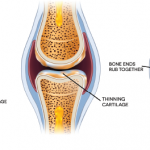Research from Baker et al. demonstrated a strong association between the presence of metabolic syndrome and lower response rates to advanced therapies in patients with RA.

Elevated BMI Associated with Pain in Patients with Hand OA
Research from Gloersen et al. suggests the systemic effects of obesity, as measured by leptin, may play a role in the severity of pain experienced by patients with hand osteoarthritis.

New Research Shows Knee Osteoarthritis Prevalence Is Rising
Studies highlighting the large numbers of people affected by knee osteoarthritis (OA) point to what clinicians who treat knee OA have been seeing for the past few decades: a substantial increase in the prevalence of knee OA in the U.S. and globally. Roughly 250 million people are affected by knee OA worldwide, and about 14…
Weight Change in Early RA & the Risk of Mortality
Sparks et al set out to investigate whether weight change during the early RA period is associated with subsequent mortality and to evaluate whether there is an RA-specific effect. They investigated weight change during the early RA period, because this is the window of time during which weight change is most likely to be related to RA-specific processes. They found that severe weight loss during the early RA period was associated with a subsequent increased mortality risk both for women with and without RA…
Obesity’s Effects on Inflammatory Markers in Patients with RA
New research has examined the effect of obesity on inflammatory markers, specifically C-reactive protein (CRP) level and erythrocyte sedimentation rate, in patients with rheumatoid arthritis (RA). Researchers found higher BMIs were associated with higher CRP levels in women both with and without RA, suggesting the phenomenon is related to adiposity and not an indication of disease activity. For men with RA, low BMI was associated with higher CRP levels, which proved to be RA-specific but not a direct causal effect of adiposity…
Changes in BMI Associated with Improvements in Disease Activity & Glucocorticoid Treatment
A recent study examined the relationship between increased BMI and antineutrophil cytoplasmic antibody–associated vasculitis treatment with glucocorticoids. The results: Weight gain was independently associated with reductions in disease activity, increased glucocorticoid exposure and randomization to rituximab. The most significant increases in BMI occurred during the first six months of treatment, and newly diagnosed patients were more likely to experience an increase in BMI…
Obesity Associated with Increased Inflammatory Markers in Rheumatoid Arthritis
NEW YORK (Reuters Health)—Obesity and higher fat mass are associated with increased levels of inflammatory markers in women with rheumatoid arthritis (RA), researchers report. “Physicians should recognize that C-reactive protein (CRP) and erythrocyte sedimentation rate (ESR) are affected by obesity in patients with and without rheumatoid arthritis, especially in women,” Dr. Michael D. George from the University of…
Weak Thigh Muscles Tied to Knee Osteoarthritis in Women
(Reuters Health)—Women with weaker thigh muscles may be more likely to develop knee osteoarthritis, a recent study suggests. Women with lower knee extensor strength were 47 percent more likely to develop knee arthritis than women who had stronger knee extensors, the study found. Weakness in the knee flexor muscles was associated with 41 percent greater…